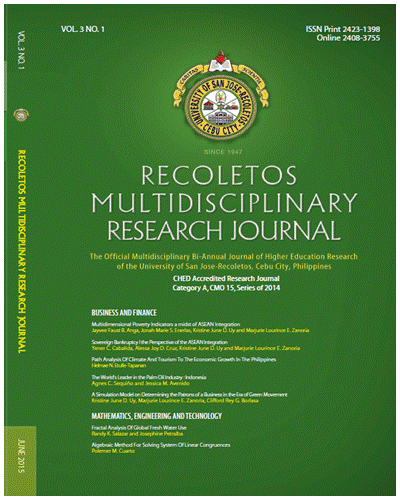Insights of Conflict Management Strategies from the Perspectives of Selected Philosophers
DOI:
https://doi.org/10.32871/rmrj1503.01.12Abstract
This study aims to draw insights and implications on conflict management strategies from selected philosophers. It utilizes textual or content analysis to present and explain what they have to say and offer about conflict management strategies. The study shows that different philosophers have varied approaches and strategies to conflict management among them are yielding, compromising, collaborating, competing, and avoiding. However, they share commonalities such as the discernment and defense of the greater good/common good over individual interests and desires; the discernment and defense of truth, rectitude, and justice over beliefs, feelings, opinions, prejudices, injustice and stereotypes; the principle of not harming others; a preventive approach to conflict management rather than curative. Therefore, philosophy is not something
abstract but offers practical strategies to manage conflict. The study is relevant because it is an additional literature on conflict management particularly from the perspective of philosophy considering that there is dearth in the literature. This study recommends that another study be made using different set of philosophers. Also, one may look into leadership or management styles reflected in the philosophy of selected philosophers.
References
Aristotle’s Ethics. Stanford Encyclopedia of Philosophy. Retrieved from plato.stanford.edu/entries/aristotle-ethics/ on January 6, 2015.
Aristotle. Nicomachean Ethics. Trans by W.D. Ross retrieved from classics.mit.edu/aristotle/nicomachaen.html on January 6, 2015.
Baird, Forrest E (2011). Modern Philosophical Classics. Sixth Edition Volume II. New York: Prentice Hall.
Cahn, Dudley and Ruth Ann Abigail (2007). Managing Conflict through Communication. New York: Pearson.
Cahn, Steven (2005). Exploring Philosophy an Introductory Anthology Second Edition. New York: Oxford University Press.
Clavell, James (1983). The Arts of War Sun Tzu. New York: Dell Publishing.
Collinson, Dianne and Katheryn Plant (2006). Fifty Major Philosophers. Second Edition. New York: Routledge.
Dale, Jacquette (2001). Philosophical Entrees Classic and Contemporary Readings in Philosophy. New York: McGraw Hill.
Flynn, T. (2004). Jean-Paul Sartre. Retrieved from Google Scholar on January 31, 2015.
Giles, Lionel “The Art of War by Sun Tzu†retrieved from http://classics.mit.edu/ on July 26, 2015.
“Golden Rule.†Internet Encyclopedia of Philosophy. Retrieved from www.iep.utm.edu/goldrule/ on January 28, 2015.
Griffith, Samuel B. (1963). Sun Tzu the Arts of War. New York: Oxford University Press.
Hampton, J. (1986). Hobbes and the Social Contract Tradition. Cambridge University Press.Retrieved from Google Scholar on January 31, 2015.
“Hobbes’s Moral and Political Philosophy.†Stanford Encyclopedia of Philosophy. Retrieved from plato.stanford.edu/entries/hobbes-moral/ on January 31, 2015.
Hobbes, T., & Curley, E. (1994). Leviathan: with selected variants from the Latin edition of 1668 (Vol. 8348). Hackett Publishing. Retrieved from Google Scholar on January 31, 2015.
Hocker, Joyce L. and William Wilmot (2011). Interpersonal Conflict. Eight Edition. New York: McGraw Hill.
“John Rawls†The internet Encyclopedia of Philosophy. Retrieved on July 26, 2015 from http://www.iep.utm.edu/
Jowett, Benjamin (2009). Crito by Plato. Retrieved on January 3, 2015 from classic.mit.edu
Kolak, Daniel and Raymond Martin (2002). The Experience of Philosophy. New York: Oxford University Press.
Kupperman, Joel (2001). Classic Asian Philosophy. New York: Oxford University Press
Leaman, Oliver (2000). Eastern Philosophy Key Readings. New York: Routledge.
Mann, Douglas and Elijah Dann (2005). Philosophy a New Introduction. USA: Wadsworth.
Machiavelli, Niccolo. (2007). The Prince. Trans. by Peter Constantine. New York: Modern Library.
Magee, Bryan (2001). The Story of Philosophy. New York: Dorling Kindersley Book.
Mill, J. S. (1869). On liberty. Longmans, Green, Reader, and Dyer. Retrieved from Google Scholar on January 31, 2015.
Mill, John Stuart. Utilitarianism. Broadview Press, 2010. Retrieved from Google Scholar on January 31, 2015.
Muller, Charles. The Analects of Confucius. Retrieved from http://www.acmuller.net/con- dao/analects.html on January 7, 2015.
Peterman, John (2007). An Ancient Philosophy. Belmont, USA: Thomson Wadsworth, 2007.
Pojman, Louis (2001). Classics of Philosophy Volume VIII the Twentieth Century. New York: Oxford University Press.
Ramsbotham, Oliver, Tom Woodhouse and Hugh Miall (2011). Contemporary Conflict Resolution. Cambridge: Polity Press.
Reynolds, B. K. (1969). Lao Tzu: Persuasion through inaction and nonâ€speaking. Retrieved from Google Scholar on January 28, 2015.
Rowe, C. J., & Broadie, S. (2002). Nicomachean Ethics. Oxford University Press. Shipka, Thomas and Arthur Minton (2004). Philosophy: Paradox and Discovery.
Solomon, Robert C (2001). Introducing Philosophy a Text with Integrated Readings. Seventh Edition. New York: Harcourt College Publisher.
“Social Contract Theory.†Internet Encyclopedia of Philosophy. Retrieved fromwww.iep.utm.edu/soc-cont/ on January 30, 2015.
Stumpf, Samuel Enoch and James Fieser (2003). Philosophy History and Problems. New York: McGraw Hill.
Weiss, R. (1998). Socrates Dissatisfied: an Analysis of Plato’s Crito. Oxford University Press.
Yu-Lan F. and Bodde D. (1949). A Short History of Chinese Philosophy. Retrieved from Google Scholar On July 26, 2015.
Downloads
Published
How to Cite
Issue
Section
License
Copyright of the Journal belongs to the University of San Jose-Recoletos


